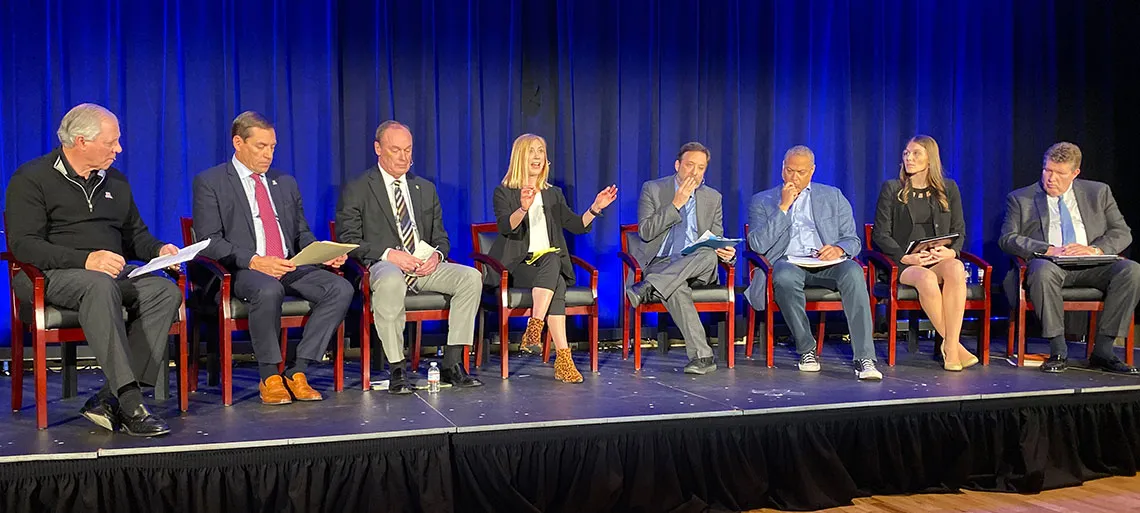Panelists Gather at University of Arizona to Discuss Name, Image and Likeness in College Athletics

Experts gathered at the University of Arizona on December 2, 2019 to discuss the controversial topic of name, image and likeness (NIL) in college athletics. Organized by Eller College Sports Management Program Director and Faculty Athletics Representative Ricardo Valerdi in conjunction with UArizona's Office of Equity, Inclusion and Title IX, and moderated by President Robert Robbins and Athletic Director Dave Heeke, the panelists shared insights on the controversial topic and what they believe to be the best path forward.
The NIL issue focuses on whether student athletes should be compensated for the use of their name, image or anything that may make them identifiable to others. This includes video games, advertisements and sponsorship deals, as well as non-sports related areas like social media. The topic has received more attention after the state of California passed a bill in September allowing college athletes to profit from their name, image and likeness, as well as sign endorsement deals and hire agents to represent them. The bill will go into effect in 2023.
The panelists—including a current university athletic director, former student athletes, several sports attorneys and a sports economist—represent some of the many parties involved in the NIL debate. Although each recognized the evolving nature of college athletics and the need for NIL action, they approached the issue from different perspectives, demonstrating its complexity.
View a video of the full panel
Rick George, athletic director at the University of Colorado, opened the floor by reminding the group that in May the NCAA Board of Governors, of which he is a part, commissioned a working group to investigate the issue of name, image and likeness. Offering a more measured approach, he assured the audience that however the Board of Governors decides to move forward, it will be a decision that is made with the best interest of the student athletes at heart. He revealed that they hope to introduce new NCAA legislation regarding NIL by 2021.
Gregg Clifton, a sports attorney who focuses on professional franchises, general labor and employment, warned that jumping straight to unlimited NIL rights for athletes could be dangerous. Recognizing the need for change, Clifton believes NIL rights should be a federal issue instead of a state issue, and would like to see a slow and steady implementation of new legislation in order not to sacrifice the integrity of the system already in place.
At the other end of the spectrum, sports economist Andy Schwarz believes athletes should fully own their individual name, image and likeness rights and that NCAA regulations regarding NIL should be abolished entirely. “The only way to fix college sports,” he says, “is to build the enterprise on the foundation of athlete’s rights rather than reforming a system that treats those rights as privileges.”
Schwarz offered a powerful analogy to argue that the competitive imbalance argument—allowing collegiate athletes to make money from their sport would shift the balance of competition—is selectively enforced when it comes to athletes. Emma Watson, the actress who played Hermione Granger in the Harry Potter movies, spent her summers away from Brown University where she studied to shoot the popular films, an action that was never regarded as an NIL issue. The same argument can be made for coaches, Schwarz argues, who are paid enormous salaries that in fact contribute to the current competitive imbalance seen in the NCAA today. However, the same logic does not apply to athletes.
Don McPherson, a former student athlete and NFL quarterback, offered perhaps the most passionate argument of the evening, reflecting on his experience at Syracuse University and the opportunities beyond athletics that he was able to take advantage of. He says that he has used this experience to grow his business and his personal image beyond the sport, “not when I’m there as a student athlete and that’s my shelf life, but when I’m 54 and I still say that my education and my experience at Syracuse University matters today. And if we don’t have student athletes that can say that,” he concludes, “then we have failed.”
McPherson argued that college athletics creates an environment that is too focused on itself, disregarding the rest of the college experience. This narrow focus is the root of the NIL problem in McPherson’s eyes. Instead, we should focus on the athlete’s experience as a whole rather than arguing whether the athletes should receive compensation or not. “Let’s stop pretending and give them the opportunity to maximize that experience as opposed to asking them to act like it doesn’t exist.”
This sentiment was shared by another panelist, Maddie Salamone, a sports attorney and former athlete at Duke University. “It’s not about paying athletes, it’s about allowing athletes to make full use of their bodies of work and their platform as athletes.” Noting that college athletes make an immense sacrifice to train in their sport, Salamone argues that athletes have the right to use their college experience to grow their own brand and create opportunities for the future. “If it really is about the full college experience, then we need to go back in that direction and allow athletes to take full advantage of everything that their university offers.”
This player-focused approach was a common theme of the panel, as sports attorney and blogger Jamie Miettinen argued that the emphasis on regulating amateurism takes the focus away from the education and the additional opportunities athletes receive on campus. “What if we modified the lens in which we view amateurism?” Miettenin asks, before adding: “It’s been changing for decades as is. Maybe now is the time that we have to change it in order to fit the modern market and society.”
Whatever the eventual solution to the NIL debate may be, the University of Arizona has helped bring the issue to light and added to the positive discourse surrounding the topic.

